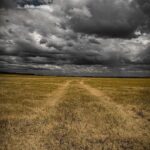Thousands evacuate as fire nears Canadian cities of Yellowknife and Kelowna
Introduction
Thousands of Canadian residents are fleeing their homes as wildfires continue to rage in the northern territories, posing a significant threat to towns and cities. With Canada experiencing its worst recorded fire season, the cities of Yellowknife and Kelowna are in immediate danger. The situation is exacerbated by strong northern winds and minimal rainfall, which are complicating firefighting efforts. As the fire inches closer to these cities, residents are being urged to evacuate, causing traffic chaos and prompting a state of emergency in Kelowna. This report will provide an overview of the current situation and explore the potential implications.
Background
Canada has faced a record-breaking fire season this year, with over 5,700 wildfires burning more than 137,000 square kilometers of land, according to the Canadian Interagency Forest Fire Centre. The city of Yellowknife, with a population of 20,000, has been hit particularly hard and is experiencing the largest evacuation of the year. The fire, located within 15 kilometers of the town’s northern edge, has the potential to reach the city limits by the weekend. Emergency officials are grappling with limited resources due to the scale of the wildfires and the challenging weather conditions.
Evacuation Efforts
The evacuation of Yellowknife has led to traffic congestion on the city’s one highway, as residents drive long distances to find safety or wait for emergency flights. The north-west winds and lack of rain are hindering efforts to slow down the fire’s progression. While there is a slight chance of rain on Friday, officials do not believe it will be enough to extinguish the fire completely. Firefighters, accompanied by aircraft and ground crews, are working diligently to contain the blaze and protect the affected communities. The Canadian government, including Prime Minister Justin Trudeau, has reassured the affected residents that support will be provided during this crisis.
Impact on Residents
The wildfires have left residents feeling fearful and uncertain about their future. Angela Canning, a Yellowknife resident, expressed her anxiety, fear, and shock about the situation. She packed her camper with important documents and family keepsakes, unsure of what she would return to or if she would even have a home left. Alice Liske, who left Yellowknife with her six children due to poor air quality, voiced concerns about the speed of the evacuation and the potential loss upon their return. The emotional toll on evacuees, coupled with the physical dangers they face, adds to the urgency of the situation.
Editorial and Advice
The escalating wildfire situation in Canada serves as a reminder of the urgent need to address climate change and its impact on our environment. The increasing severity and frequency of wildfires are evidence of the changing climate patterns and the need for immediate action. Governments, both domestically and internationally, must prioritize implementing sustainable practices and reducing carbon emissions to mitigate the risk of devastating wildfires.
From an individual perspective, it is essential to be prepared for emergencies such as evacuations due to natural disasters. Creating an emergency kit with essential supplies, documents, and personal items can provide a sense of security during uncertain times. Staying informed about local evacuation plans and following the instructions of emergency officials is crucial for personal safety and the efficient management of resources.
Furthermore, protecting our environment through responsible practices such as proper disposal of flammable materials, reducing waste, and supporting sustainable initiatives can play a significant role in preventing and managing wildfires. We must all do our part in preserving our natural surroundings for future generations.
In conclusion, the wildfires near Yellowknife and Kelowna highlight the severity of the ongoing fire season in Canada. The evacuation efforts and the emotional and physical toll on residents underscore the need for proactive measures to address climate change and emergency preparedness. As the situation unfolds, it is vital to support affected communities and prioritize the conservation of our environment.

<< photo by Chirag Nayak >>
The image is for illustrative purposes only and does not depict the actual situation.
You might want to read !
- Title: “Blazing Threat: Canadian Cities of Yellowknife and Hay River Brace for Massive Evacuation as Wildfire Edges Closer”
- Canadian Bushfires Unleash Destruction on Kelowna and Yellowknife: A Dual City Crisis
- Australians Stranded: the Ordeal of Yellowknife Evacuees Denied Flights
- The Rise and Fall of Rocker Love: Natalie Bassingthwaighte’s Marriage Crumbles Under the Spotlight
- “Farewell to a Rugby League Legend: Rabbitohs Premiership Winner Kyle Turner Passes Away at 31”
- The Incarceration Debate: Examining Claims of Jail as a “Respite” for Remote Aboriginal Communities
- “Rina Sawayama Takes a Stand: Confronting Matty Healy’s Controversial Actions”
- “Feds Probe PGA Tour and LIV Golf Deal: Unraveling the Controversy”




